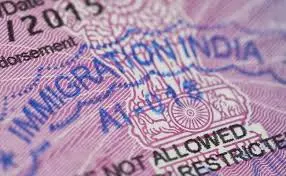Immigration and Foreigners Bill tabled in Lok Sabha
Rejecting suggestions that Parliament lacked the legislative competence to bring the bill, minister of state for home Nityanand Rai said that the Central government has all the rights under the Union list to bring legislation on the subject

NEW DELHI: The Immigration and Foreigners Bill 2025, seeking to streamline various services related to immigration and foreigners, including their entry, exit and stay in the country, was introduced in the Lok Sabha on Tuesday, with the Opposition dubbing it to be violative of the constitutional provisions.
Rejecting suggestions that Parliament lacked the legislative competence to bring the bill, minister of state for home Nityanand Rai said that the Central government has all the rights under the Union list to bring legislation on the subject.
Mr Rai asserted that while tourists were welcome to come to India, it was the government's responsibility to ensure peace and sovereignty of the nation remain intact.
Opposing the bill at the introduction stage, Congress MP Manish Tewari said that the bill is violative of multiple provisions of the Constitution and various laws.
“The bill violates the principle of fundamental rights and the government may use the provisions of the proposed law to deny entry to those who are not in sync with the ideology of the ruling dispensation of the day,” Mr Tewari said.
Opposing the introduction of the bill, TMC MP Saugata Roy said that the proposed law could prevent the inflow of talent from outside in various fields.
Before formally introducing the bill in the Lok Sabha, Mr Rai said that the draft law seeks to correct overlapping and duplicate provisions in prevailing laws governing immigration and foreigners in the country.
The legislation is aimed at streamlining various services related to immigration and foreigners, including their entry, exit and stay in India. The entry, stay and exit of foreigners from India are currently governed by the Registration of Foreigners Act 1939 and the Foreigners Act 1946.
While Indian visas of all categories to foreigners can be granted in physical or sticker form by Indian missions or posts located abroad, the bureau of immigration (BoI) grants electronic visas under seven categories to people from 167 countries.
Besides, visa-on-arrival is granted by immigration authorities at six designated airports to nationals of three countries -- Japan, South Korea and the UAE (only for such UAE nationals who had earlier obtained e-visa or regular or paper visa for India). The stay and movement of foreigners in India and their exit are regulated by the BoI and state governments and Union territory administrations.
According to existing laws, all foreigners on long-term (more than 180 days) student, medical, research, employment, missionary and project visas are required to register with the foreigners regional registration officer (FRRO) or the foreigners registration officer (FRO) concerned, having jurisdiction over the place where the foreigner intends to stay, within 14 days of arrival.
Pakistani nationals are required to register within 24 hours of their arrival. Other laws that cover foreigners in India include the Citizenship Act 1955, which regulates the acquisition and termination of Indian citizenship as well as the acquisition and registration of foreigners as Overseas Citizens of India (OCI).
The Passports Act, 1967, provides for the issue of passports and travel documents to regulate the departure from India of citizens of India and other persons and the Immigration (Carriers' Liability) Act 2000 makes carriers liable in respect of passengers brought by them into India in contravention of provisions of the Passport Act.
Apart from movement, stay and visa, there are certain protected areas in India where foreigners need special permits to travel, including multiple states in the northeastern region, the whole of Andaman and Nicobar, and parts of Jammu and Kashmir, Uttarakhand, Himachal Pradesh and Rajasthan.
According to Union home ministry data, a total of 98.40-lakh foreigners visited India between April 1, 2023 and March 31, 2024.
